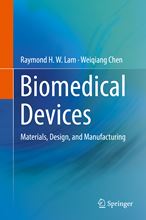BE-GY 6513: Biomedical Device Design and Development

|
Course Description: This course aims to provide the essential knowledge in the biomedical product development (e.g. material properties, fabrication processes and design techniques for different applications) in order to provide ways to speed up the product development cycle. This course is multidisciplinary and covers the principles in mechanical, chemical, biological, and physiological aspects. Students can learn the techniques to apply the acquired knowledge of biomedical device design, prototyping, and manufacturing for particular applications they are interested. Prerequisite: Undergraduate course in Physics. Course Objectives: |
Textbook: Biomedical Devices: Materials, Design, and Manufacturing, by Raymond H. W. Lam & Weiqiang Chen, Springer Nature, 2019
BE-GY 6783: Biomechanics for Biomedical EngineersCourse Description: Biomechanics covers a wide selection of topics ranging from the mechanics of single cells and biological tissue behaviors to the dynamics of human movement. This course aims at bridging the gap between Biomedical Engineering topics and Biomechanics by introducing students to fundamental physiology and pathophysiology concepts. Mechanical knowledge will be linked to examples encompassing a wide range of scales, from cellular biomechanics to skeletal biomechanics. Each system, whether a cell or the skeleton, will be analyzed from a mechanical viewpoint by reducing it to its essential elements, using the laws of mechanics and then tying mechanical insights back to biological function. As a result, students with gain a deeper understanding of both the mechanics and the biology than from qualitative study alone. Course Objectives: Textbook: Introductory Biomechanics: from Cells to Organisms, by C. Ross Ethier and Craig A. Simmons, Cambridge University Press, 2007 |
|
ME-UY 4653: Introduction to BioMEMS and MicrofluidicsCourse Description: This course targets to: (1) introduce fundamental design and microfabrication concepts of BioMEMS, microfluidics and lab-on-chip systems, (2) expose students to the relevant biomedical and biological applications. The course is divided into three main sections: (i) BioMEMS/Microfluidic materials and microfabrication, (ii) BioMEMS sensors and actuators, and (iii) Microfluidic and Lab-on-Chip systems. Prerequisite: MT-UY 2813 Introduction to Materials Science, ME-UY 3513 Measurement Systems. Course Objectives: Textbook: Biomedical Microsystems, 8th ed., by Ellis Meng, CRC Press, 2012 |
|
ME-GY 6843-I: Advanced Manufacturing of Biomedical DevicesCourse Description: This course aims to provide the essential knowledge in the biomedical product development (e.g. material properties, fabrication processes and design techniques for different applications) in order to provide ways to speed up the product development cycle. This course is multidisciplinary and covers the principles in mechanical, chemical, biological, and physiological aspects. Students can learn the techniques to apply the acquired knowledge for particular applications they are interested. Prerequisite: Knowledge in Material Science and Mechanics of Materials or equivalent. Recommended Readings: |
|
ME-UY 3513: Measurement SystemsCourse Description:This course is a 3 credit Mechanical Engineering course required for a Bachelor degree in ME. This course addresses electrical circuits and components, filtering, dynamic measurement system response characteristics, analog signal processing, digital representation, data acquisition, and sensors. This course also requires computer-based simulation of measurement systems. Prerequisite: PH-UY 2023 Electricity, Magnetism, and Fluids. Course Objectives: Enable students to formulate and solve problems involving: electrical circuits and components, filtering, dynamic measurement system response characteristics, analog signal processing, digital representation, data acquisition, sensors. Enable students to use computer simulation tools such as Matlab to study measurement systems. Textbook: Introduction to Mechatronics and Measurement Systems, 4th Ed., by Alciatore & Histand, McGraw-Hill, 2011 |
|
ME-UY 3333: ThermodynamicsCourse Description: The course centers on properties of pure substances; concepts of work and heat; closed and open systems. Topics: Fundamental laws of thermodynamics. Carnot and Clasius statements of the 2nd law; entropy and entropy production; heat engines, refrigerators, heat pumps; efficiencies, coefficients of performance. Prerequisite: PH-UY 2033, MA-UY 1124 and MA-UY 2132. Textbook: Thermodynamics: An Engineering Approach, 8th ed., by Yunus Çengel & Michael A. Boles, McGraw-Hill, 2014 |
